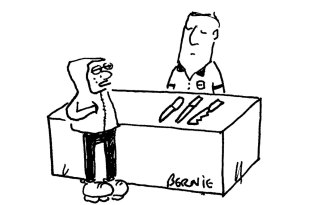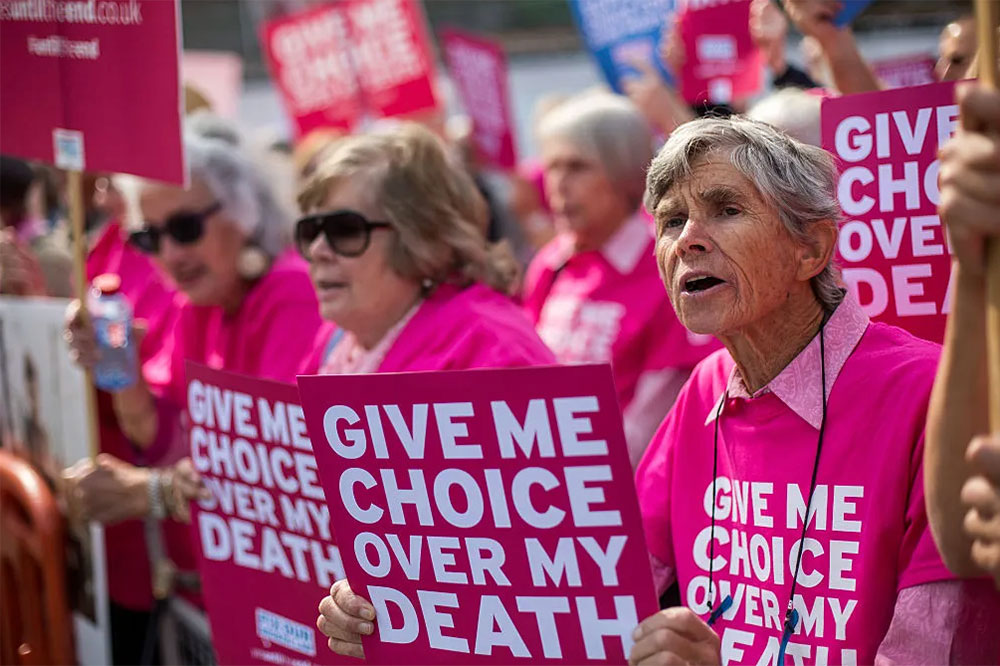Matthew Parris has narrated this article for you to listen to.
‘If I’d known where it would take me I might never have started.’ This need not be an expression of regret. There are journeys where the final destination is best hidden from the traveller, due to the psychological difficulty he may have in embracing the future until we’re nearly there. This column will move on to assisted dying, but I start with a look back at the fight for equal rights for same-sex couples. I played a minor part in this.
We played down the idea of noisily assertive gay pride, knowing it would hinder our campaign
Ever since the 1950s, brave souls – at first just a few – fought for the repeal of 19th-century laws criminalising male homosexual behaviour. They were joined by others, finally even politicians. In 1967, Roy Jenkins’s Sexual Offences Bill passed parliament, decriminalising private homosexual acts between men aged 21 and over. This remains the most important step in British gay history. John Major’s reduction to 18 of the age of consent, Tony Blair’s further reduction to 16, his civil partnerships legislation and David Cameron’s Marriage (Same Sex Couples) Act were all not only legislatively consequential upon it, but a product of the cultural momentum Jenkins set in motion.
Margaret Thatcher was among those voting for the (Labour) Bill. I had spoken to our late prime minister about these matters. Mrs Thatcher (as she was) typified in her approach the attitude – then considered ‘modern’ – that won the argument. Thatcher’s consoling hand on my wrist after we spoke in 1986 will be always in my memory. ‘There,’ she said. ‘That must have been very difficult for you.’ Her (for a 1950s woman) liberal view was that homosexuality was a personal misfortune, but not a matter for the police. We gays ‘couldn’t help it’. If we kept this behaviour to ourselves, we shouldn’t be persecuted.

Gay men may now recoil in horror from such an attitude but – make no mistake – this was the approach that won the argument for the first big step that broke the taboo. This was the only pitch that worked ‘on the doorstep’.
Our opponents argued that it was a slippery slope; that our campaign would lead to demands for total equality of esteem; that homosexuality would burst out all over the place and prove contagious, even popular; and ‘spread’ as a lifestyle choice. Privately I rather agreed with them, but our campaign ducked such a scenario. All we wanted, we argued, was to be left alone. We played down the idea of noisily assertive gay pride, knowing it would hinder, not help, our campaign.
In the event what was to moral reactionaries a dystopian future has come to pass; the sky has not fallen in; and few – even among reactionaries – would go back to 1950s laws and attitudes.
Should I, then, have been bolder? Embraced the destination rather than what I suspected to be only the first leg of a more ambitious journey? Honesty gives one answer to that question, tactical wisdom another.
I’m old now, wearying of tactics. So on assisted dying I’ll go for honesty. Those of us who believe that the terminally ill for whom life has become unbearable should have the right to command its end, face (naturally) strong opposition. Much of it comes from religious people who often hide their personal investment in their faith and attach themselves instead to secular and medical claims, aware that ‘God’ does not, these days, clinch a public debate. Perhaps the most formidable secular argument they attach themselves to – and we should acknowledge it – runs as follows. Once (they say) the idea becomes normalised that those for whom the weight of suffering has become too heavy should be able to end it, there will follow an increase in pressure on the terminally ill to lift the burden that looking after them places on caring relatives. ‘Nobody’ (replies the campaign for assisted dying) ‘would be so cruel as to urge a sick, elderly loved one to consider suicide.’
‘Ah, maybe not,’ replies the opposition, ‘but even if nothing is said – even if the caring companions would not in fact want their loved one to do any such thing – the loved one will think it. How often do we hear people say they don’t want “to be a burden on others”? Once our national culture openly condones such an act, the terminally ill may put pressure on themselves to do the deed.’ Moral pressure is a thing that may be felt even if it is not being applied by others.
I’m afraid to say that I think that this is probably right. I sweep aside with impatience the argument that greedy relatives will trick the infirm into thinking it’s all over; that carers will insinuate thoughts of suicide into the minds of confused elderly patients. Very few are so horrid. With equal impatience do I hear claimed reports of miraculous partial recoveries at death’s very door. One or two, no doubt, but weighed against the misery of the 99 per cent whose terminal diagnosis turns out to be accurate, a few Lazaruses should not tip the balance. But as to adding pressure upon the terminally ill to lift the burden they’re placing on others… well, let me bite the bullet. In time, I think that the spread and acceptance of assisted dying may indeed do that. And let me bite deeper into the bullet. I think this would be a good thing.
With advances in medical science, humans will get older and older, spending longer and longer as invalids, and with more and more of the last years of their lives in a condition that brings little pleasure and increasing pain. The option to foreshorten this will have to be more easily available and social mores will change to accommodate it.
That includes the responsibilities the terminally ill feel towards those who must support them. We do feel these responsibilities now. We always have. It is natural. We are right to acknowledge their weight. To act upon these feelings will eventually be normalised in popular morality. That is where this legislative journey ends, and that is where it should.







Comments